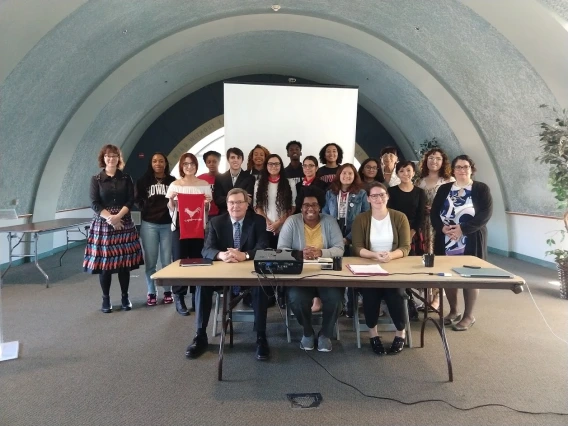
University of Arizona students from underrepresented backgrounds majoring in Russian and Slavic Studies joined peers from Howard University and the University of Puerto Rico in Washington, D.C. as part of a multifaceted effort to increase diversity in the field.
The October conference was the first in a series of events, supported by a grant from the U.S. Russia Foundation, to connect students at minority serving institutions with one another and working professionals in government, academic and nonprofit careers.
“This is the first time a program like this has happened,” said Colleen Lucey, an assistant professor of Russian and Slavic Studies and one of the faculty leaders on the program. “Normally, this type of work is done at just one university. Here, there’s coalition building between institutions to foster a collaborative environment for students of color. We want the students to have a network post-graduation they can rely on and utilize to make a difference in the field.”
The Washington trip, organized by Howard Professor Amarilis Lugo de Fabritz, included trips to the Library of Congress, the Institute of Peace, the U.S.-Russia Foundation and Georgetown University, as well as the conference hosted by Howard. As an experienced instructor of Russian language and culture, Lugo de Fabritz has inspired academics across the United States to create a more inclusive environment for students of diverse backgrounds entering Russian programs and participating in study abroad.
“One of the major goals of the grant is in order to create long-term support for students of color, we have to build connections between universities, both in the U.S. and in Russia,” Lucey said. “We also got to connect with UA alumni in the D.C. area who have a ton of experience and have gone onto illustrious careers, in the state department, in nonprofits and in private sector work and speak to how they mobilized their degrees in the humanities to actualize their potential on the job market.”
The next phase of the collaborative grant program will be a study abroad trip to Russian in May for students from underrepresented populations. University of Arizona students will travel together with students from Howard University and the University of Puerto Rico for an immersive cultural experience in Moscow, St. Petersburg and Novgorod.
Ally Felix, a Russian and Microbiology double major, said meeting fellow students who represent minorities in the Russian and Slavic Studies field was eye-opening, especially hearing Spanish and Russian spoken in the same room, and made her feel less alone pursuing a degree in Russian.
“Seeing such diverse students studying Russian proved that Russian is still a valuable and important subject and language. I was also able to make connections with these students that I feel will last well past our undergraduate degrees,” she said. “As far as professional growth, it was exceedingly beneficial for me to meet so many Russian majors who now have careers in the real world.”
Jahnavi Akella, a double major in Russian and Political Science, said connecting with others who shared a similar experience was an energizing and fortifying experience.
“At this conference, I was able to find community I didn’t explicitly know I lacked. As POC, we often don’t realize on a conscious level that we are missing community in our professional circles until we meet others who share our experiences,” she said. “Getting exposure to new opportunities, networking with high-level professionals, and exploring new scholarship in Russian and Slavic studies from diverse perspectives made this conference truly life-changing and exceptional.”
Dana Brouillard, double majoring in Russian and Political Science, said the experience gave her more direction and focus as she considers career options.
“This workshop was transformative for me for so many reasons. It was incredible to get to see the diverse interest in Russian and Slavic Studies and to see that different backgrounds shape opinions and views,” she said. “I will always be grateful for the people I got to meet and the experiences we were able to have. I feel much more clear-headed about my future and I don’t think it’s possible to say how tremendously valuable that is.”
Aundrea Nebitsi, also double majoring in Russian and Political Science, said the students from different universities were able to talk openly about how their identities impact their connections to Russian and Slavic Studies.
“Meeting exclusively students of color and hearing their stories made me feel as if I was looking at myself, and my own thoughts and feelings about Russian and Slavic Studies,” she said. “I was able to relate to certain connections that they had made to their personal lives that I had never expressed to anyone before, or I hadn’t had the words to express before. I felt heard, understood, and supported. The interactions between the students allowed us to feel a real sense of camaraderie and develop a support network.”

